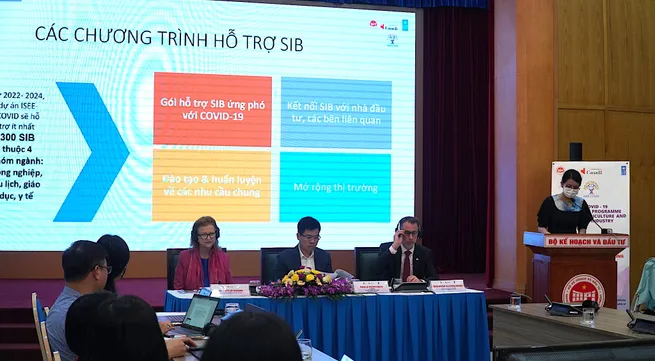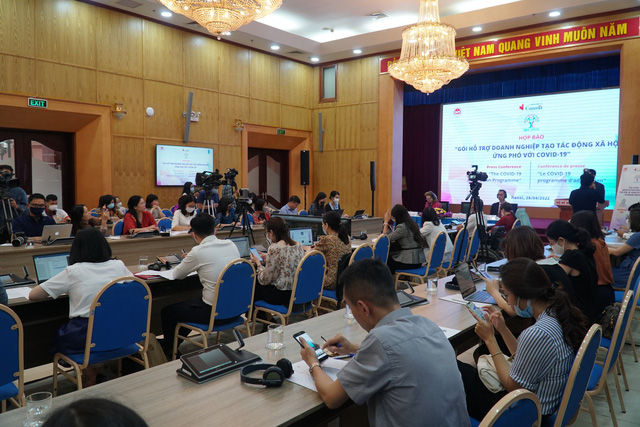New COVID-19 adaptation Programme for Social Impact Businesses

Ha Noi, 28 April 2022, The Agency of Enterprise Development (AED) under the Ministry of Planning and Investment (MPI), Global Affairs Canada (GAC), and the UN Development Programme (UNDP) jointly launched today the “COVID-19 Adaptation Programme” for Social Impacted Businesses (SIBs) to increase their capacity and refine business models to address the challenges they are facing.
SIBs are understood as “organizations that have both trading activities and a commitment to positively impacting society/environment as the two central tenets of their strategic operations. This balancing of their social/environmental aims with a commercial model allows them to sustainably solve social and environmental challenges.”
Viet Nam has a vibrant and rapidly growing ecosystem for SIBs. Jobs, wellbeing, and environmental protection make up the top three areas of impact for SIBs. SIBs are leaders in promoting diversity and inclusion. Balancing profit with impact is a sustainable business model.
The number of COVID-19 cases in Viet Nam is decreasing but the adverse effects of COVID-19 on the businesses, especially those led by the vulnerable groups, are still prolonged and damaging. UNDP study in August 2021 showed that household businesses and micro, small and medium enterprises found their revenue declined sharply, forcing them to cut back operation and lay off workers. Enterprises in tourism, restaurants, hotels, and passenger transportation were those that hardest hit. This impact is exacerbated among female-headed households.
General Director of MPI’s Agency for Enterprise Development Le Manh Hung shared: “This support package will contribute to helping SIBs remove the above bottlenecks and difficulties through concrete actions, such as sending experts and intermediary organizations to accompany SIBs in six months to solve specific problems in management, business, and product development. Especially, the COVID-19 Adaptation Programme also provides seed fund of VND100 million for each enterprise to build and test new business models. This is a very valuable resource for SIBs in their reality of difficult access to financial resources”.
UNDP Resident Representative in Viet Nam Caitlin Wiesen commended Viet Nam for its rapid and equitable roll-out of the vaccination programme, bringing the country back to normal life. However, she is concerned about the adverse effects of COVID-19 on the businesses.

“Our baseline assessment showed that nearly 47% of interviewed Social Impact Businesses had their revenue reduced due to COVID-19. Businesses with the highest percentage of revenue reduction belonged to the groups employing people with disabilities, ethnic minorities, and cooperatives,” said Ms. Wiesen. “We hope that the COVID-19 Adaptation Programme will timely provide the necessary technical and financial support for the SIBs to realize their innovative ideas to solve their own challenges, thus benefiting vulnerable groups”.
“Despite the challenges SIBs are facing, we believe that they have many qualities that help them succeed such as passion, commitment, sense of responsibility, and innovation. We believe that with the support of the COVID-19 Adaptation Programme, they will gain more will-power to make changes to lives of vulnerable groups as well as the Vietnamese society” - said Head of Cooperation, Embassy of Canada to Viet Nam, Brian Allemekinders.
As the flagship support for SIBs in the “Leveraging Viet Nam’s Social Impact Business Ecosystem in Response to COVID-19”- ISEE-COVID project, the COVID-19 Adaptation Programme is expected to help SIBs to (i) identify critical challenges due to Covid-19; (ii) design new business models or develop new products/ services to adapt to Covid-19; and (iii) build and test prototypes of products/services with the seed funds.
In 2022, the Programme will support 30 SIBs in the agriculture and tourism industries, focusing on the SIBs led by women and vulnerable groups. Each selected SIB will receive a 6-month coaching service and funding of VND 100,000,000 to identify, build and test the prototypes or new business models.
The AED, GAC, and UNDP encourage eligible Social Impacted Business to submit Expression of Interest to participate in the Programme. All social enterprises, impact startups, cooperatives, and small and medium enterprises that work with or work for the vulnerable groups, in the agricultural and tourism sectors, are welcome to apply for the programme. There is no restriction on population group, occupation, or geographical location as long as the businesses support vulnerable groups and the proposed business models, and new products/ services are innovative, sustainable, scalable, and relevant to adapt to the challenges by COVID-19.
Timeline of the Programme:
• 28 April 2022: Launching the Programme and Call for Expression of Interest
• 28 April – 9 May 2022: submission of Expression of Interest online
• May- June 2022: Evaluation and selection of 30 SIBs to participate the Programme
• June – November 2022: Implementation of the Programme
• December 2022: Showcase the results in the Final Day event
About the ISEE-COVID project
The project “Leveraging Viet Nam’s Social Impact Business Ecosystem in Response to COVID-19” (ISEE COVID project), with sponsorship from Global Affairs Canada, is co-implemented by UNDP and Agency of Enterprise Development (AED), Ministry of Planning and Investment. The project aims to enhance the resilience of social impact businesses (SIBs) in Viet Nam and contribute to reducing the impact of COVID-19 on vulnerable groups, especially women and girls. The ISEE COVID project has two primary objectives: (i) improving the effectiveness of SIBs, especially those led by women and vulnerable groups, to address the social and gendered impacts of COVID-19 and accelerate the achievement of the SDGs; and (ii) strengthening the regulatory environment for SIBs to be more gender-responsive, inclusive and transparent, thereby supporting the resilience of SIBs to COVID-19 impact, with a particular focus on SIBs that are led by women and other vulnerable groups.





